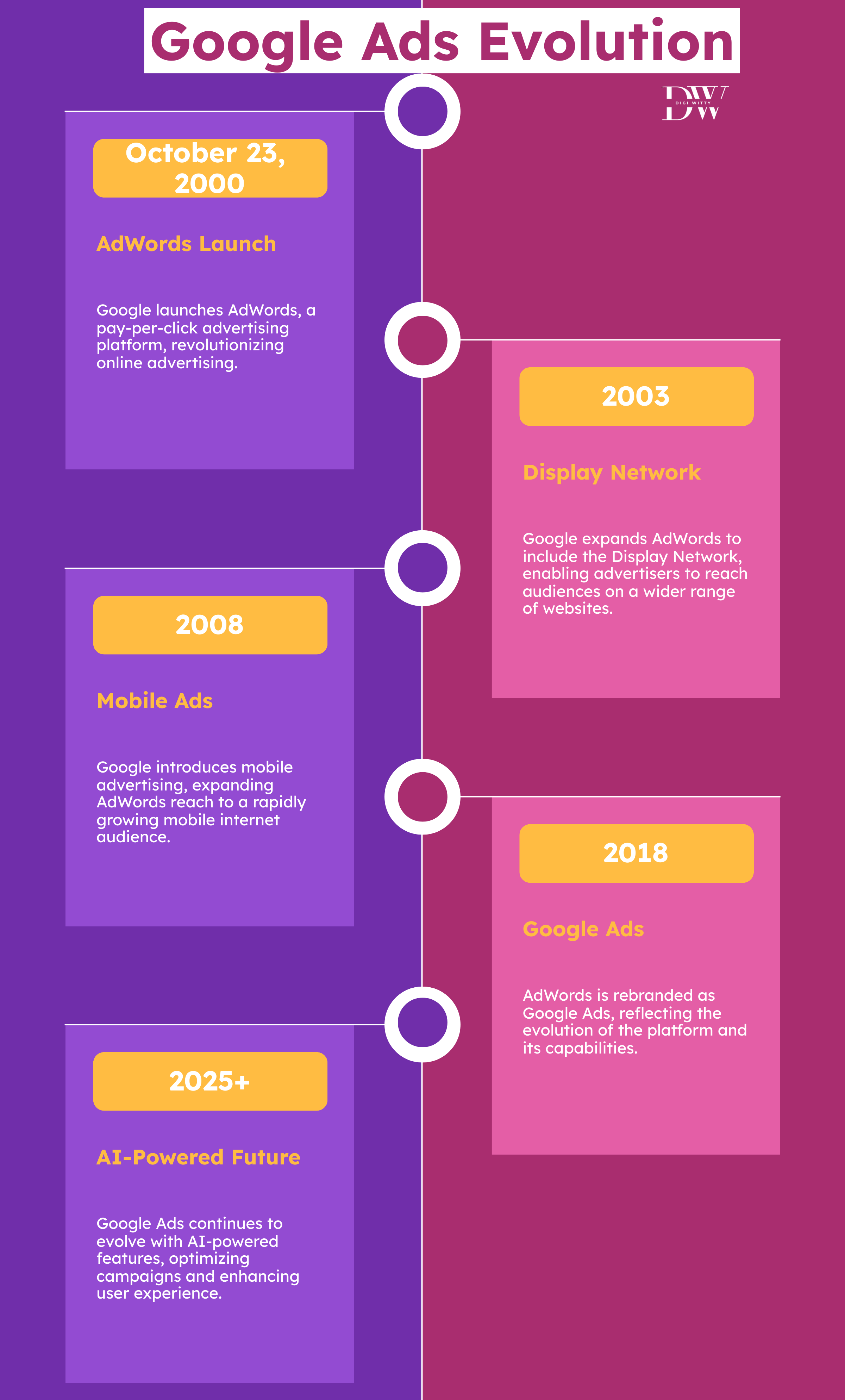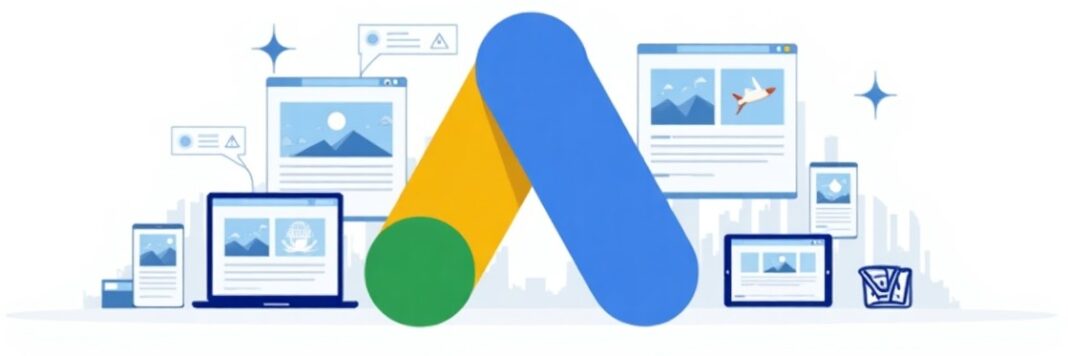The Giant That Changed Digital Advertising Forever
Back in the early 2000s, Google was just a search engine—and it introduced Google AdWords, that was an advertising platform for common people to reach their audience online.
Fast forward to 2025, and Google Ads has become a powerhouse, helping millions of businesses reach global audiences through AI, automation, and multi-channel marketing.
In this blog, we’ll take you on a journey through the evolution of Google Ads, how it was started and has been changing and adapting according to the need of business and helping people to promote their products & services. It is also become the main resource of lead generation & sales.
2000: The Birth of Google AdWords
Google AdWords launched in October 2000 & introduced a simple concept:
Let advertisers pay to display their ads in Google’s search results.
Key Features in the Beginning:
- Only 350 advertisers in the first phase
- Pay-per-click (PPC) model introduced
- Ads appeared alongside organic search results
- Targeting based solely on keywords
It was revolutionary in the world of digital marketing. Businesses could reach buyers at the exact moment they were searching for a product or service. Thus, this laid the foundation for the digital world to come

2005–2010: The Rise of Display Ads & Analytics
As Google’s network grew with time, so did the options for advertisers.
Key Milestones:
- Google AdSense and Display Network allowed advertisers to show ads on other websites
- Google Analytics launched in 2005, allowing better tracking of ad performance
- Remarketing introduced, allowing brands to re-engage users who visited their website
This period marked a shift in targeting strategies from simple keyword targeting to audience-based strategies.
2013: Enhanced Campaigns and Mobile-First Era
With the rise of smartphones, Google noticed a shift in user behavior. At that time, people were using mobile phones rather than desktop or laptop. So, more searches were happening on mobile.
In response, Google launched Enhanced Campaigns, which allowed:
- Device-specific bid adjustments
- Location and time-based targeting
- A single campaign for all devices (mobile, tablet, desktop)
Why It Mattered:
Marketers could now analyze & optimize their ads for mobile users, leading to better ROI and engagement.
2018: Goodbye AdWords, Hello Google Ads
In 2018, Google rebranded AdWords to Google Ads—a signal of how much the platform had evolved.
What Changed with Google Ads:
- Integration of Search, Display, YouTube, Shopping, and App campaigns in one place
- A focus on automation, AI, and smart bidding
- Introduction of Responsive Search Ads (RSAs) powered by machine learning
Quote from Google:
“The new Google Ads brand represents the full range of campaign types, including Search, Display, and Video.”
This signaled a change toward a more intelligent, automated, and multi-channel advertising ecosystem.
2020–2023: Automation and Smart Campaigns Take Over
The pandemic accelerated digital transformation—and Google Ads responded with even more automation.
Major Introductions:
- Smart Campaigns: Perfect for small businesses with minimal setup
- Performance Max Campaigns: One campaign to rule them all (Search, Display, YouTube, Gmail, Maps)
- Smart Bidding strategies: Target CPA, Target ROAS, Maximize conversions—all AI-driven
Why This Matters: These tools make advertising faster, easier, and more efficient.
2024–2025: AI, First-Party Data & Privacy-First Future
As we move into 2025, privacy changes (like cookie deprecation) and AI advancements are reshaping Google Ads.
New Trends:
- AI-generated ad creatives and copy using tools like Bard and Gemini
- Enhanced customer match using first-party data
- Conversion modeling to fill data gaps caused by privacy restrictions
- More voice and visual search integration into ad targeting
Google Ads Features in 2025:
- Dynamic AI-written ads that adjust in real time
- Zero-cookie remarketing using Google’s Privacy Sandbox
- Conversational AI assistants helping users build campaigns in seconds
Then vs. Now: A Quick Comparison
| Feature | 2000s | 2025 |
| Platform Name | Google AdWords | Google Ads |
| Targeting | Keywords | Keywords + AI + Audiences |
| Devices | Mostly Desktop | Mobile, Desktop, Voice, Wearables |
| Ad Types | Text ads only | Search, Display, Video, App, Shopping, Performance Max |
| Strategy | Manual CPC | Smart Bidding (AI-driven) |
| Data Privacy | Cookies | First-party data + Privacy Sandbox |
| User Support | Limited | AI campaign builders & chatbots |
Tips to Succeed with Google Ads in 2025
If you want to win with Google Ads today, follow these expert tips:
1. Embrace Automation
- Use Smart Bidding and Performance Max
- Let Google’s AI optimize your ads in real-time
2. Leverage First-Party Data
- Collect emails and use Customer Match
- Track conversions with enhanced conversions and Consent Mode
3. Diversify Your Creatives
- Add video, images, and responsive search ads
- Use AI tools to generate variations
4. Focus on Audience, Not Just Keywords
- Use in-market audiences, affinity groups, and custom segments
5. Test & Learn
- Run experiments to A/B test strategies
- Monitor performance with Google Analytics 4 (GA4)
The Future of Google Ads: What’s Next?
Here’s what we might expect in the next 2–5 years:
🔮 Hyper-personalized ad experiences based on user preferences
🔮 Voice-command-based ad building
🔮 VR and AR-based ads in Google Maps and YouTube
🔮 Deeper integration with Google Workspace and Android devices
Conclusion: Google Ads Has Come a Long Way
From its humble beginnings in 2000 to the AI-driven ad platform of 2025, Google Ads has completely changed the way we approach digital marketing.
It’s no longer about manual keyword bidding—it’s about understanding your audience, leveraging automation, and delivering value across channels.
Whether you’re a small business owner or a digital marketing pro, mastering Google Ads is non-negotiable in today’s competitive world.
👉 What’s your experience with Google Ads? Share your thoughts or questions in the comments below!


